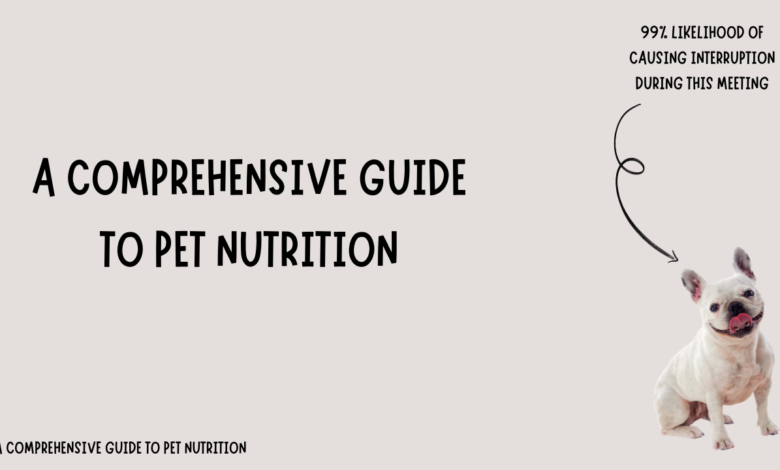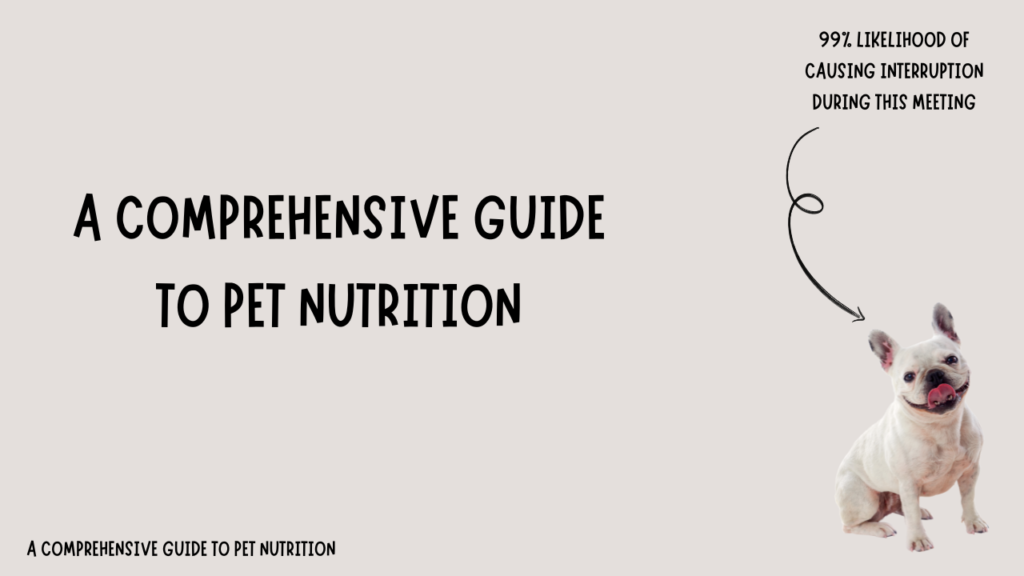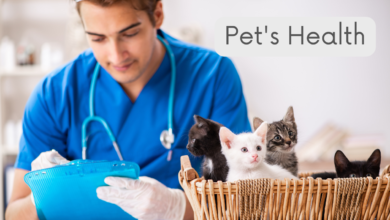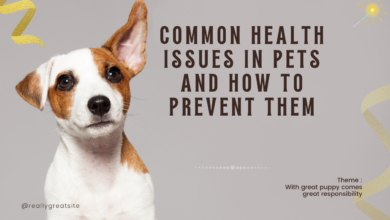
Proper nutrition is fundamental to the health and well-being of pets. Just like humans, pets require a balanced diet to maintain optimal health, energy levels, and longevity. Understanding the nutritional needs of your pet and providing a diet that meets those needs is essential for their overall health.

This comprehensive guide covers the basics of pet nutrition, the dietary requirements of different types of pets, and practical tips for feeding your furry, feathered, or scaly companions.
Understanding Basic Nutritional Needs
- Macronutrients:
- Proteins: Essential for growth, repair, and maintenance of tissues. Proteins are crucial for building muscles, skin, hair, and internal organs. Animal-based proteins (meat, fish, eggs) are typically more digestible for pets than plant-based proteins.
- Fats: Provide a concentrated source of energy and are essential for healthy skin and coat. Fats also aid in the absorption of fat-soluble vitamins (A, D, E, and K) and contribute to overall cell function.
- Carbohydrates: Provide energy and aid in gastrointestinal health. While not as crucial as proteins and fats, carbohydrates in the form of grains, vegetables, and fruits can be beneficial in a balanced diet.
- Micronutrients:
- Vitamins: Essential for various metabolic processes. Key vitamins for pets include Vitamin A (vision and immune function), Vitamin D (bone health), Vitamin E (antioxidant properties), and B vitamins (energy metabolism).
- Minerals: Necessary for bone development, nerve function, and overall cellular processes. Important minerals include calcium, phosphorus, potassium, and magnesium.
- Water:
- The most vital nutrient, necessary for every bodily function. Ensure your pet has constant access to clean, fresh water to stay hydrated and support overall health.
Dietary Requirements for Different Pets
- Dogs:
- Balanced Diet: Dogs are omnivores and require a balanced diet that includes proteins, fats, carbohydrates, vitamins, and minerals. Commercial dog foods are formulated to meet these needs, but it’s essential to choose high-quality brands.
- Life Stage Nutrition: Puppies, adult dogs, and senior dogs have different nutritional needs. Puppies require more protein and calories for growth, while senior dogs may need lower-calorie diets to prevent obesity.
- Special Diets: Some dogs may have specific dietary requirements due to allergies, health conditions, or breed-specific needs. Consult with a veterinarian to determine the best diet for your dog’s individual needs.
- Cats:
- Carnivorous Diet: Cats are obligate carnivores, meaning they require animal-based proteins and fats for optimal health. Taurine, an essential amino acid found in meat, is crucial for heart and eye health in cats.
- Moisture Content: Cats have a low thirst drive and are prone to urinary tract issues. Wet cat food or incorporating moisture-rich foods can help maintain hydration.
- Life Stage Nutrition: Like dogs, cats have different nutritional needs at various life stages. Kittens require higher protein and fat content, while senior cats may need diets tailored to kidney health and weight management.
- Small Animals:
- Rabbits: Require a diet high in fiber. Hay should be the primary component of a rabbit’s diet, supplemented with fresh vegetables and a small amount of pellets.
- Guinea Pigs: Need a diet rich in Vitamin C, as they cannot synthesize it themselves. Fresh vegetables, hay, and fortified pellets are essential.
- Hamsters and Gerbils: Thrive on a mix of seeds, grains, and fresh fruits and vegetables. Commercially prepared food mixes are convenient and balanced.
- Birds:
- Species-Specific Diets: Different bird species have unique dietary requirements. Parrots, for example, need a varied diet of seeds, fruits, vegetables, and pellets, while canaries and finches thrive on a diet primarily of seeds and some fresh foods.
- Nutritional Variety: Birds benefit from a varied diet to prevent nutritional deficiencies and provide mental stimulation. Fresh fruits, vegetables, and occasional nuts or seeds can be included.
- Reptiles and Fish:
- Reptiles: Dietary needs vary widely among reptiles. Herbivorous reptiles like iguanas require a diet of leafy greens and vegetables, while carnivorous reptiles like snakes need whole prey items. Insectivorous reptiles like geckos and lizards need live insects.
- Fish: The diet of fish depends on the species. Some fish are herbivores, others are carnivores, and some are omnivores. High-quality commercial fish food, supplemented with fresh or frozen foods, ensures balanced nutrition.
Practical Tips for Feeding Your Pet
- Portion Control:
- Overfeeding can lead to obesity and related health issues. Follow feeding guidelines on commercial pet food packaging and consult your veterinarian for specific recommendations based on your pet’s age, weight, and activity level.
- Regular Feeding Schedule:
- Establish a consistent feeding routine to help regulate your pet’s digestion and prevent overeating. Most adult pets benefit from being fed once or twice a day, while young pets may require more frequent meals.
- Quality of Food:
- Choose high-quality pet food that lists specific animal proteins as the main ingredient. Avoid foods with excessive fillers, artificial preservatives, colors, and flavors. Reading labels and understanding the ingredients can help you make informed choices.
- Homemade Diets:
- If you prefer preparing homemade meals for your pet, ensure the diet is nutritionally balanced. Consult a veterinarian or a pet nutritionist to develop a diet plan that meets all of your pet’s nutritional needs.
- Treats and Supplements:
- Treats should be given in moderation and should not exceed 10% of your pet’s daily caloric intake. Choose healthy, natural treats and avoid those with high sugar or fat content. Supplements may be necessary for pets with specific health conditions or dietary deficiencies but should be used under veterinary guidance.
Common Nutritional Problems and How to Address Them
- Obesity:
- Obesity is a common issue in pets and can lead to various health problems, including diabetes, joint issues, and heart disease. Monitor your pet’s weight, provide regular exercise, and adjust their diet as needed to maintain a healthy weight.
- Food Allergies and Sensitivities:
- Some pets may develop allergies or sensitivities to certain ingredients. Common allergens include beef, chicken, dairy, and grains. If your pet shows signs of food allergies, such as itching, gastrointestinal issues, or skin problems, consult your veterinarian for an appropriate diet plan.
- Nutrient Deficiencies:
- Feeding a balanced diet is crucial to prevent nutrient deficiencies. Symptoms of deficiencies vary but can include poor coat condition, lethargy, and developmental issues. Ensure your pet’s diet meets all their nutritional needs, and consult your veterinarian if you suspect a deficiency.
Conclusion
Proper nutrition is the cornerstone of a healthy, happy pet. By understanding your pet’s unique dietary needs and providing a balanced diet, you can ensure they live a long and healthy life. Remember to consult with your veterinarian for personalized dietary advice and to address any specific health concerns. With the right nutrition, your pet will thrive and bring joy to your family for years to come.




